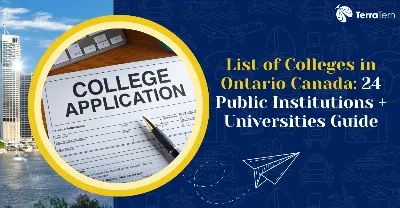Key Highlights
- Latest List of Colleges in Ontario Canada: Latest Guide & Update 2025
- What Are Ontario's 24 Public Colleges? (Complete Official Directory)
- How Many Universities Are in Ontario, Canada 2025?
- Comprehensive Universities and Specialised Institutions in Ontario Canada 2025
- University Degree Programmes and Research Focus Colleges in Ontario Canada 2025
- Which Ontario Colleges Offer the Best Programmes in 2025?
- How Do I Apply to Ontario Colleges and Universities in 2025?
- What Are the Tuition Costs for Ontario Colleges and Universities in 2025?
- Cost Comparison Table: Colleges vs. Universities (2025 Estimates)
- Conclusion
The post-secondary route that one embarks on in Ontario, Canada, is a world of opportunities. The province has a centre of excellence in the academic field with a rich and list of colleges in Ontario Canada, and list of colleges and universities in Ontario Canada. This landscape is what can bring domestic and international students on the way to success in their educational and career journey. Let’s know more about the list of colleges in Ontario, Canada!
Latest List of Colleges in Ontario Canada: Latest Guide & Update 2025

Ontario comprises 24 publicly funded list of colleges in Ontario Canada and 21 universities that offer various educational pathways to both domestic and international students. The list of colleges in Ontario Canada system in the province offers practical, career-oriented programs in over 900 programs, whereas universities offer degree programmes that focus on research-oriented studies. The important institutional types are:
-
Public Colleges: 24 higher institutions with diplomas, certificates, and applied degrees.
-
Universities: 21 degree-granting institutions of undergraduate and graduate programmes.
-
University Colleges: Federated institutions in larger university systems that are specialised.
Institutions of specific professions and trade schools.
This is a complete listing of admission requirements, programme specialisations, campus location and 2025 enrolment information that assists the student in making an informed educational choice for his/her Canadian academic pursuits. Let’s know more on list of colleges and universities in Ontario Canada!
What Are Ontario's 24 Public Colleges? (Complete Official Directory)
Ontario's 24 public colleges are a vital part of the province's education system, known for their career-oriented education, strong industry connections, and high graduate employment rates. Here is a list of colleges in Ontario Canada.
|
College Name |
Founding Date |
Main Campus Location |
Approx. Enrollment |
Signature Programs |
|
Algonquin College |
1967 |
Ottawa |
20,000 |
Business, Public Safety, Health Sciences, Design |
|
Cambrian College |
1967 |
Sudbury |
4,800 |
Mining, Skilled Trades, Health Sciences |
|
Canadore College |
1967 |
North Bay |
3,500 |
Aviation, Health Sciences, Film Production |
|
Centennial College |
1966 |
Toronto (Scarborough) |
26,000 |
Transportation, Hospitality, Media Arts |
|
Conestoga College |
1967 |
Kitchener |
16,000 |
Engineering and Technology, Apprenticeships, Business |
|
Confederation College |
1967 |
Thunder Bay |
3,000 |
Aviation, Health Sciences, Natural Resources |
|
Durham College |
1967 |
Oshawa |
13,000 |
Justice, Media, Health Sciences |
|
Fanshawe College |
1967 |
London |
21,000 |
Aviation, Design, Health Sciences |
|
Fleming College |
1967 |
Peterborough |
6,800 |
Environmental and Natural Resources, Business, Trades |
|
George Brown College |
1967 |
Toronto |
29,000 |
Culinary Arts, Fashion, Early Childhood Education |
|
Georgian College |
1967 |
Barrie |
13,000 |
Automotive Business, Tourism, Health Sciences |
|
Humber College |
1967 |
Toronto (Etobicoke) |
33,000 |
Business, Media, Health Sciences |
|
La Cité collégiale |
1990 |
Ottawa |
5,000 |
French-language Health, Business, Social Services |
|
Lambton College |
1967 |
Sarnia |
3,500 |
Chemical Production, Fire and Public Safety |
|
Loyalist College |
1967 |
Belleville |
3,800 |
Health and Wellness, Public Safety, Media |
|
Mohawk College |
1966 |
Hamilton |
17,000 |
Health Sciences, Engineering, Business |
|
Niagara College |
1967 |
Welland, Niagara-on-the-Lake |
12,000 |
Hospitality and Tourism, Culinary Arts, Viticulture |
|
Northern College |
1967 |
Timmins |
2,500 |
Mining, Trades, Emergency Services |
|
Sault College |
1965 |
Sault Ste. Marie |
2,500 |
Natural Environment, Aviation, Health Sciences |
|
Seneca College |
1967 |
Toronto (North York) |
30,000 |
Aviation, Animation, Business |
|
Sheridan College |
1967 |
Oakville, Brampton, Mississauga |
23,000 |
Animation, Illustration, Digital Media |
|
St. Clair College |
1967 |
Windsor |
12,000 |
Automotive, Health Sciences, Skilled Trades |
|
St. Lawrence College |
1967 |
Kingston, Cornwall, Brockville |
8,000 |
Health Sciences, Business, Community Services |
|
Collège Boréal |
1995 |
Sudbury |
2,000 |
French-language programs in Health, Trades, Business |
Central Ontario Public Colleges
GTA and the other urban areas have a number of the largest and most prominent colleges in the province. These institutions form part of the economy of the region, as they offer a skilled labour force and training in areas of high demand.Let’s know more on list of colleges and universities in Ontario Canada!
-
Centennial College is a multicampus college located in Scarborough, and it is a global leader in the field of applied learning. Its transportation programmes, especially aviation and automotive technology programmes, are industry-known.
-
George Brown College is based in the urban centre of Toronto, providing a downtown, urban learning experience. Its culinary expertise and hospitality specialisations are unrivalled, and its attention is on practical experience in a large metropolitan centre.
-
The Humber College is a renowned polytechnic in Toronto and Etobicoke. Humber has a rich portfolio of programmes, which include a blended learning model that combines theoretical understanding with practical experience, preparing graduates to take on a job right after graduation.
-
The Mohawk College of Hamilton is a nucleus in the Golden Horseshoe region. Its health science courses, such as nursing and medical technology, are considered very desirable because of a high clinical placement.
College Network Eastern Ontario
The national capital region, which forms the eastern end of the province, has a list of colleges in Ontario Canada with special emphasis on bilingualism and government-related courses. Let’s know more about list of colleges in Ontario Canada!
-
Algonquin College in Ottawa is one of the frontrunners in the capital area. Its physical location beside the government offices and the large number of high-technology companies gives students unmatched chances of university internships and career placements.
-
St Lawrence College consists of campuses in Kingston, Cornwall, and Brockville and forms part of the Eastern Ontario community. Its healthcare and community services programmes are well considered, and they benefit both the community and economy.
-
The Cité collégiale is an essential component of the network, and it provides a complete variety of programmes solely in French. This serves the needs of the Francophone population of the province and offers a special educational experience to students with the desire to improve their use of the French language in the workplace.
Northern and Northwestern Ontario Institutions
Colleges in Northern and Northwestern Ontario are tailored to the needs of the unique geographic and demographic location, such as remote communities and Indigenous peoples.
-
Northern College and Confederation College have courses that mirror the economy of the areas, and mining, natural resources and skilled trades are given significant focus. The institutions are very important in equipping the labour force in the main industries of the region.
-
The leadership of Indigenous education in these northern colleges, where culturally relevant programmes and support services are provided to First Nations students, is also a strength of the colleges. They offer essential access to higher education to members of isolated and rural populations. Their service delivery is mainly comprised of distance programmes and satellite campuses, which make it accessible over very large distances.
Also Read: Best Colleges in Canada for Masters Programs: Update
How Many Universities Are in Ontario, Canada 2025?

There are 21 degree-granting list of colleges in Ontario Canada, a blend of world-leading research institutions, full-line universities, and focus schools. This is a varied group that have a wide variety of undergraduate and graduate programmes. Let’s know more on list of colleges in Ontario Canada!
Major Research Universities (U15 Group Members)
The U15 Group of Canadian Research Universities is the most research-intensive universities in the country. In Ontario, four such highly ranked universities exist, and they are the global leaders in the area of innovation and discovery.
-
University of Toronto (U of T): U of T was established in 1827, and it is always rated as one of the best public universities in the world. It has three campuses in Toronto and is a research and academic powerhouse that draws the best students and faculty in the world. Its programmes of signature include Medicine, Engineering, and Business.
-
University of Waterloo (UW): UW is the most innovative university in Canada, with a focus on both technology and co-operative learning. Its Faculty of Engineering and Computer Science competencies are also famous due to their industry-oriented co-op terms that allow students to have a positive employment experience.
-
McMaster University: McMaster University is a university in Hamilton known to have medical and health sciences programmes. The problem-based learning approach and innovative research in health and engineering have given the university a good international reputation.
-
Western University: Western University is a leading institution in London, Ontario, with leaders and an academic performance orientation. Ivey Business School is known worldwide, and the university has a rich campus culture.
Comprehensive Universities and Specialised Institutions in Ontario Canada 2025
On top of the large research universities, the educational environment is diverse in Ontario, with many comprehensive and specialised institutions that address the interests of various students and their careers. Let’s know more on list of colleges in Ontario Canada!
-
York University: York University is one of the largest universities in Canada, with a great variety of undergraduate and graduate courses in such areas as law, business, and liberal arts. The university has a reputation for a diverse student body and high social justice and community involvement.
-
Carleton University: Carleton is a full-fledged university based in Ottawa, and its programmes in public affairs as well as journalism, coupled with the engineering course, enjoy a high reputation. Its closeness to the federal government agencies and advanced technological companies offers special opportunities to students.
-
OCAD University: OCAD U is the largest and oldest university of art and design in Canada; it is a specialist institution located in Toronto. It concentrates on visual arts, media, and design and provides a creative and practical approach to higher education.
What is the Difference between Colleges and Universities in Ontario?
The decision that a prospective student makes in terms of choosing between a list of colleges in Ontario, Canada, and a university is a major one. Although they both provide helpful post-secondary education, they vary radically in the type of programmes they provide, their credentials, time span, and career results. Let’s know more about the list of colleges in Ontario, Canada!
Programs and Credentials in Colleges
-
College education in Ontario is typified by a practical and on-the-job learning process. Programmes are modelled to be career-oriented and equip students with the specific skills and knowledge they need in the job market.
-
Credentials Colleges mostly provide diplomas (usually two to three years) and certificates (one year or less). There are also many that provide applied courses and undergraduate certificates in particular subjects and postgraduate certificates to students who already have a first degree or diploma.
-
*Learning Model: College programmes are more project-oriented with a smaller class size and direct interaction with instructors, who most often have a wealth of industry experience. Co-op placements/apprenticeships form part of the fabric of the college experience, giving students important work-integrated learning.
University Degree Programmes and Research Focus Colleges in Ontario Canada 2025
Education at universities in Ontario focuses on academic theory, critical thinking, and research. A degree is the main qualification that is awarded, which gives a general knowledge base and equips students with a wide range of professional and academic directions. Let’s know more on list of colleges in Ontario Canada!
-
Qualifications: Universities provide undergraduate degrees (Bachelor's) that usually require three to four years to earn. They are also providing graduate degrees (master's) and doctoral programmes (PhD) to pursue higher studies and research.
-
Focus: The university learning model is both lecture-based and the orientation is on independent research and theoretical knowledge. Before they specialise, the students are urged to study a wide variety of subjects, and the curriculum is geared to build strong analytical and problem-solving skills.
|
Feature |
Colleges |
Universities |
|
Primary Credential |
Diploma, Certificate, Applied Degree |
Bachelor's, Master's, PhD |
|
Program Focus |
Career-oriented, hands-on, practical |
Academic, theoretical, research-intensive |
|
Duration |
1-3 years (Certificate/Diploma), 4 years (Applied Degree) |
3-4 years (Bachelor's), 1+ year (Master's), 3+ years (PhD) |
|
Class Size |
Generally smaller, more intimate |
Often larger lectures, with smaller labs/tutorials |
|
Faculty Expertise |
Industry professionals, practical focus |
Academic researchers, theoretical focus |
|
Career Outcomes |
Job-ready skills for specific vocations |
Foundational knowledge for diverse professions |
Which Ontario Colleges Offer the Best Programmes in 2025?

It is necessary to pay attention to the strength of programmes and industry affiliations when choosing from a list of colleges in Ontario Canada. According to the statistics of graduate employment, student satisfaction, and the partnership, list of colleges in Ontario Canada excel in some key areas.
Best healthcare and nursing schools.
The Ontario healthcare sector is a large employer, and colleges have a critical role in producing the next generation of healthcare workers.
-
Fleming College boasts of good health sciences with high licensing exam pass rates in the Practical Nursing and Personal Support Worker programmes.
-
Centennial College in Toronto boasts a Centre of Health and Wellness and well-established clinical placement affiliations with large hospitals, offering students the much-needed practical experience.
-
Hamilton's Mohawk College is a pioneer in health and wellness training and has a top-tier facility that has established a tradition of producing highly competent graduates in all types of health sciences.
Top Technology and Engineering Majors.
The technological industry in Ontario is currently on a spurt, and colleges are leading the pack in producing qualified graduates in areas such as IT, engineering technology, and advanced manufacturing.
-
Conestoga College is a technological and engineering centre. Its co-op programmes and joint ventures with firms in the Kitchener-Waterloo tech sector also give students a first-mover advantage in the industry.
-
Humber College provides various tech-oriented programmes, such as software development and cybersecurity, and applies a particular emphasis on applied learning and industry partnership.
-
Sheridan College is also known worldwide for its animation and digital media programmes as well as its tech programmes, such as mobile computing and game development; these are all in high demand among students intending to work in the creative technology industry.
How Do I Apply to Ontario Colleges and Universities in 2025?
The list of colleges in Ontario Canada and universities application process is a centralised and simple process. It is important to know the steps, deadlines, and requirements to submit a successful application.
Application Central Ontario Colleges Application Central (OCAS) Process
The Ontario Colleges system has one online application portal that manages it. This will make it easier for students who apply to two or more colleges and programmes.
Steps to Apply:
1. Research and Select: Search and visit programmes and colleges using the ontariocolleges.ca website. You may choose as many as five programme options, not exceeding three per college.
2. Create an Account: Sign up for an account on the ontariocolleges.ca portal.
3. Application: Have a completed application, including your personal details, academic background, and programme options.
4. Pay the Fee: You will have to pay a non-refundable application fee in order to apply.
5. Send Transcripts: In high school, grades are normally returned by the high school. In the case of other applicants, the submission of official transcripts is your duty.
6. Review Offers: Colleges may start sending out offers of admission as early as November, and most of them have a May 1 common deadline.
Ontario Universities Application Centre (OUAC) Requirements
The list of colleges in Ontario, Canada, is centralised by the OUAC. This enables the students to make more than one application to different universities.
Steps to Apply:
1. Select Programs: OUAC research university programs (ouac.on.ca).
2. Apply: You will apply using a particular OUAC application, based on your applicant type (e.g., current Ontario high school student, out-of-province, or international).
3. Finish the Application: Fill in your personal details, academic history, and programme preferences. You may apply to as many programmes as you desire, and different fees apply with each.
4. Send Transcripts: This is for current Ontario high school students: Your grades will be automatically submitted by your school. It will be the responsibility of all other applicants to forward their transcripts to OUAC.
5. Send Supportive Materials: There are programmes in which other materials, like a portfolio, personal statement, or interview, are required.
6. Review Offers: The most common offers of admission are received between the end of winter and the end of June.
Also Read: MLC College Canada: Fees, Programs, Admission & Careers
What Are the Tuition Costs for Ontario Colleges and Universities in 2025?

It is an important consideration in a student's decision because of the cost of education. In Ontario, tuition fees differ according to the institution, course, and residence status of the student.
Costs and Financial Aid at the College Programme
College education is normally cheaper than university education, and financial aid is offered to students in Ontario in a large measure.
-
Domestic Students: The mean fee of a domestic student pursuing a college diploma programme is about 2,400 annually. Graduate certificates have an average cost of $3,600, and the applied degree may cost an average of about $6,100/year.
-
International Students: The costs of international tuition fees are extremely high, ranging from 14,000 to 18,000 per year for diploma programmes.
-
Financial Aid: The Ontario Student Assistance Program (OSAP) is a loan and grant programme used to assist eligible students in paying their fees. Colleges also provide a range of scholarships, bursaries and work-study programmes that offer part-time work in college.
-
University Living and Tuition: The tuition of universities is indicative of the research-intensive nature of the institutions, and the price may be vastly different between programmes as well as reputations.
-
Domestic Students: Undergraduate programmes in arts and humanities – average tuition for a domestic student is between 6,000 and 8,000. Niche courses such as engineering, medicine or law may be much more expensive.
-
International Students: International undergraduate tuition fees may vary between 20,000 and more than 50,000 a year, depending on the university and programme.
-
Living Expenses: Living costs, on top of tuition, are another cost that is to be budgeted by students and may include residence fees, meal plans, books, and transportation. On-campus living and meal plans may increase the total by 10,000 to 15,000 annually.
Cost Comparison Table: Colleges vs. Universities (2025 Estimates)
Let’s know more on list of colleges in Ontario Canada and their cost comparison:
|
Item |
Colleges (Domestic) |
Universities (Domestic) |
|
Average Tuition |
2,400 - 6,100 |
6,000 - 15,000+ |
|
Books & Supplies |
1,300 - 2,000 |
1,500 - 2,500 |
|
Ancillary Fees |
800 - 1,200 |
1,000 - 1,800 |
|
Total Annual Cost (Approx.) |
4,500 - 9,300 |
8,500 - 19,300 |
Note: International student costs are significantly higher and vary widely by institution.
Conclusion
Ontario's comprehensive post-secondary education landscape offers diverse pathways through its list of colleges in Ontario, Canada, and 21 universities, serving over 400,000 students annually. Whether pursuing hands-on college diplomas, research-intensive university degrees, or specialised professional programs, students benefit from world-class facilities, industry partnerships, and strong graduate employment outcomes. The province's bilingual education options, international student support services, and pathway programs between colleges and universities create flexible educational journeys tailored to individual career goals and learning preferences. Choosing the right institution is a personal journey, and with this guide, prospective students are better equipped to navigate their options and find the perfect fit for their Canadian academic journey in 2025. Visit TerraTern to know more!






